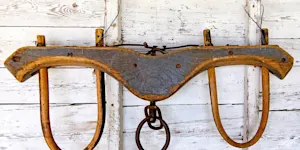What Makes This Word Tick
"Scuttle" is a bit of a chameleon in the English language, switching between meanings with ease. It can refer to hurriedly running away or, with a different hat on, describes the act of sinking a ship deliberately. Interestingly, there's also a less-known usage in British English where it means a coal bucket. So, whether fleeing the scene, meeting a watery end, or feeding a fire, "scuttle" juggles its roles with aplomb.
If Scuttle Were a Person…
If "scuttle" were walking among us, they'd be that neighbor who is always rushing off somewhere, never revealing exactly where to. Picture someone in a hurry, perhaps with a slightly mischievous glint in their eye. They're full of surprises, sometimes disappearing just as quickly as they appeared. And, true to its nautically inclined sense, it's not hard to imagine them with a pirate's swagger and a secret or two!
How This Word Has Changed Over Time
"Scuttle" has sailed through time with its nautical roots intact. Originally from the Late Latin "scutella," meaning a dish or platter, its maritime meanings developed in the context of sabotage — think ships being deliberately sent to Davy Jones' locker. Over centuries, it sped into the broader usage to mean rushing about, making it relevant in daily life far from the sea.
Old Sayings and Proverbs That Use Scuttle
While there may not be a treasure trove of proverbs that include "scuttle," the concept of swift, secretive movement has long been part of our tales. You might think of it in lines like "run for the hills" or "make a quick getaway," which capture something of its spirit. When you scuttle, you're not just moving — you're moving with purpose and stealth.
Surprising Facts About Scuttle
Did you know that "scuttling" can be a crucial act in ensuring that old warships don't become hazards? Just like a movie stunt, it's done under careful control. Another fun tidbit is the role of "scuttle" in the animal kingdom — crabs are often said to scuttle because of their sideways gait, making them poster critters for this lively verb.
Out and About With This Word
Next time you're on a beach holiday, watch how the crabs scuttle sideways with incredible speed and agility — nature's little escape artists. Or, if you're wandering through a coal-mining museum, you might spot an old-fashioned scuttle used to hold coal by the fire. It’s a word that adds a dash of color to both natural and historical landscapes.
Pop Culture Moments Where Scuttle Was Used
Remember Disney's "The Little Mermaid"? The seabird Scuttle, with his endearingly faulty human knowledge, gives the word an entertaining twist. This friendly, fumbling character adds a sense of whimsy, underlining how the word captures varied dimensions — from the fast-moving to the slightly scatterbrained.
The Word in Literature
In literature, "scuttle" often describes rapid, sometimes panicked movement. You might find it skittering through thrillers when characters need to beat a hasty retreat. It can also show up in tales of the sea, tied to historic naval practices where ships are intentionally sunk. It’s a word that adds urgency and drama to the narrative.
Moments in History with Scuttle
During World War I and II, scuttling was a tactic used by naval forces to prevent ships from falling into enemy hands. One famous event was the scuttling of the German fleet at Scapa Flow in 1919. The word might not pop up everywhere in history books, but its actions were certainly dramatic and impactful.
This Word Around the World
In different languages, the concept of "scuttle" might translate to bustling or deliberately sinking. For instance, in French, "saborder" refers to scuttling a ship. Each language captures a slightly different nuance, whether it’s about daily hustle or strategic military maneuvers. It’s a fascinating reminder of how words travel and evolve.
Where Does It Come From?
"Scuttle" wanders into English from the Late Latin "scutella," a dish or platter, but its nautical journeys began in Middle English. Its evolution saw it take on the sea-faring, hurried connotations we know today, a testament to centuries of linguistic twists and turns.
How People Misuse This Word
Sometimes people mix up "scuttle" with "scuddle," which isn't even technically a word. While "scuttle" involves moving quickly or deliberately submerging, its sometimes similar-sounding cousin can lead to confusion. Always remember, to "scuttle" isn't merely a scurry but can also be a captain's decision to send a ship to the depths.
Words It’s Often Confused With
Scurry: While both imply quick movement, scurry lacks the maritime or destructive nuance.
Shuffle: This word suggests slower or aimless movement, unlike the purposeful rush of scuttle.
Sink: More of a natural consequence, whereas scuttle implies intent.
Additional Synonyms and Antonyms
Synonyms include "dash," "hasten," and "retreat," each offering a flavor of urgency or panic. Antonyms would be "dawdle," "linger," or "delay," conjuring images of leisurely or hesitant movement.
Want to Try It Out in a Sentence?
Why not tell a story about the time someone scuttled out of a room just in time to dodge an incoming surprise? Or consider describing a stormy night where a fleet was scuttled to avoid capture. Those situations bring "scuttle" to life with action and consequence.
















